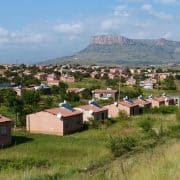|
Getting your Trinity Audio player ready...
|
By Mia Hunt
First published on Global Government Forum
Patricia De Lille, the minister of public works and infrastructure, announced recently that “lifestyle audits” will be carried out on all senior staff in her department, in a bid to tackle corruption in government.
The news followed a renewed pledge by President Cyril Ramaphosa in his State of the Nation address in February 2018, in which he said he has “no doubt that the lifestyle audits will contribute significantly in defeating corruption and the abuse of public resources for private gain”.
In line with Ramaphosa’s directive, De Lille gave instructions for lifestyle audits – which assess the difference between staff income and lifestyle – to start in August 2019, with herself first in line.
“In his 2018 State of the Nation address President Ramaphosa spoke of lifestyle audits for elected officials,” De Lille noted in her budget vote speech in July 2019. “I have instructed my department that such audits must be completed between August 2019 and June 2020, and that I want my lifestyle to be audited first.”
She also said that hundreds of millions of rands looted in her department would be recovered, and that future tender processes would be open to public scrutiny.
“We are doing all we can to recover looted money and stem the tide of wasteful and corrupt losses. There are presently 37 dockets registered with the police geared towards the recovery of R29-million,” De Lille added. “We are also supporting the Special Investigating Unit in court processes to recover R155-million in excessive expenditure on the Nkandla project and finalising outstanding disciplinary and criminal matters in this regard.”
Task team
It is not yet clear who will carry out the lifestyle audits, or how the auditing process itself will be scrutinised, but in response to oral questions in the National Council of Provinces in September, Ramaphosa said that there were various options for how the audits could be implemented across government. He said a technical task team has been established to develop a framework for the audits, with a view to developing a sustainable model that is consistent with the country’s Bill of Rights and relevant legislation.
The task team, which comprises the Presidency’s director-general, Dr Cassius Lubisi, and seven entities including the South African Police Service, the Anti-Corruption Task Team and the Financial Intelligence Centre, was expected to make its recommendations by the end of October 2018. “This will enable me to further apply my mind and will provide an opportunity for further consultation before a final decision is reached on the nature, form and scale of the proposed lifestyle audits,” Ramaphosa said.
However, at the time of publication, the South African government had not been able to clarify to Global Government Forum whether the task team had submitted its report, or to answer questions on the auditing process. A spokesperson said only that “preparation [for the lifestyle audits] is underway”.
Disciplinary action
In setting out her plans for her department, De Lille said that a “consequence management unit” will be established to ensure those found to be corrupt would face the appropriate disciplinary action.
While most believe the decision to implement lifestyle audits is a noble one, speakers at the Public Sector Forum in February raised concerns – including the length of time they would take to complete, privacy issues, and the belief that “corrupt masterminds” would get away.
Anti-corruption measures have become a top priority in South Africa since its former president Jacob Zuma, who has faced numerous legal battles over allegations of racketeering and corruption, resigned in February 2018 when the ANC recalled him as president. Zuma gave evidence at an anti-corruption inquiry last month.
Ramaphosa, who succeeded Zuma, is under pressure to curb corruption in government, and lifestyle audits have been set out as one of the first steps.








